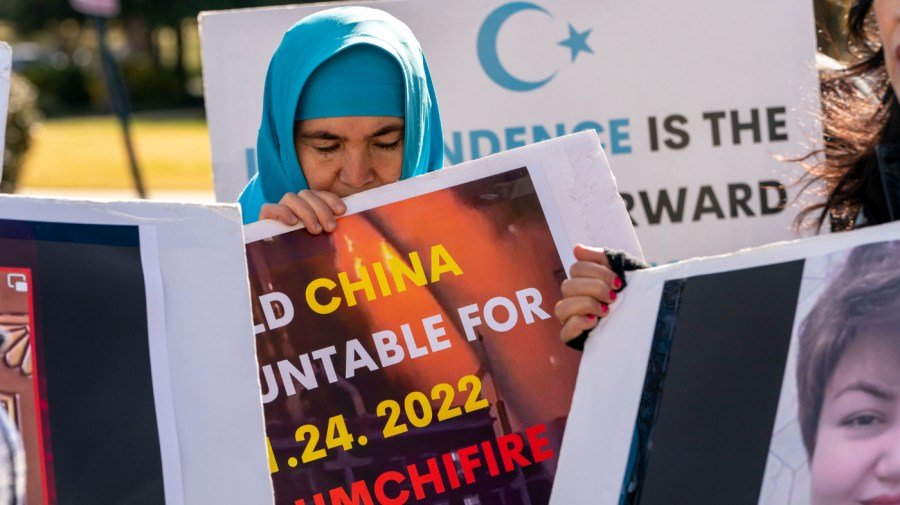
My last visit home to Kumul, Xinjiang, was in June 2016, when I was just a Uyghur youth studying abroad. I did not know it would be my last trip home, my last meal with my grandparents, the last hug from my father and the last time I felt I belonged.
Later that year, the Chinese government under Xi Jinping began a campaign of mass arbitrary detention of up to a million Uyghurs and other Turkic Muslims in the Xinjiang Uyghur Autonomous Region.
Chinese authorities detained people in political reeducation camps, officially called “vocational education and training centers,” and in prisons without due process.
Since 2016, my organization and others, have documented torture, forced disappearances, mass surveillance, cultural and religious persecution, separation of families and forced labor.
In August 2022, the U.N. High Commissioner for Human Rights released a landmark report finding that these abuses “may constitute international crimes, in particular crimes against humanity” and urged the Chinese government to take “prompt steps to release all individuals arbitrarily deprived of their liberty” in the region.
Three years on, the Chinese government continues to deny the report’s findings and recommendations as “illegal and void.” It has also doubled down on propaganda by trying to cultivate a sense of “normalcy” in the region.
However, as U.N. High Commissioner Volker Turk said last year, “many problematic laws and policies remain in place” in Xinjiang.
An estimated half-million people who received long prison sentences remain in custody, including many prominent Uyghur intellectuals, cultural figures and religious leaders.
Many Uyghurs abroad, myself included, still have little to no contact with family members. Some don’t even know if their loved ones taken into custody or forcibly disappeared by Chinese authorities are still alive.
Since the early days of the crackdown, friends and relatives deleted me from their WeChat and stopped answering my phone calls. Because I live abroad, I became a “threat” to their security.
I lost contact with the last person on my WeChat — my father, Memet Yaqup, a businessman and former civil servant — in June 2018.
It took me two years to trace him to a detention camp in my home town, where Chinese authorities held him for being an “untrustworthy” person for having relatives abroad. It took me another two years to learn that he is now serving a 16-year sentence in a prison near Urumqi, the regional capital.
I still don’t know his exact location, health condition or even the reason for his conviction.
Beijing brands Uyghurs abroad who speak up for their loved ones as liars and tries to silence them with a form of intimidation and retaliation known as transnational repression.
A combination of transnational repression and propaganda is evident in the Chinese government’s travel restrictions. It only allows a carefully selected few Uyghurs to travel to or from Xinjiang and strictly vets those desperate to reunite with their family members.
To control the diaspora, officials instruct visiting Uyghurs to collect information about Uyghur activists and press them to praise the Chinese Communist Party for its Xinjiang policies.
A Uyghur who participated in a government propaganda tour of Xinjiang told me: “I didn’t know if I would ever have another chance to see my family, which is why I chose to participate in the tour.”
The Chinese government has organized such propaganda tours for foreign diplomats and the media, as well as some Uyghurs, to promote its narrative of supposed normalcy in the region, while blocking independent and unfettered access of observers and U.N. human rights experts to Xinjiang.
When I visited the U.N.’s Geneva headquarters for the first time in June, I felt the Chinese government’s heavy influence. Some diplomats refused to meet with me, even privately. Some activists asked to meet outside the headquarters to avoid Chinese government surveillance.
One U.N. expert matter-of-factly stated: “You must not have anyone back home,” acknowledging the potential consequences of a U.N. visit to discuss human rights in China for my relatives still in Xinjiang.
The Chinese government’s attempts to silence Uyghur critics abroad make it even more important for the U.N. and concerned governments to speak up.
Some diplomats asked me if it is still worth making public statements about abuses in Xinjiang during the U.N. Human Rights Council’s September session and to mark the third anniversary of the U.N.’s groundbreaking report.
The answer is a resounding yes.
Before the next anniversary, the high commissioner should publish a comprehensive update on Xinjiang and brief the Human Rights Council.
Governments should press China to release everyone arbitrarily detained and hold the government accountable for crimes against humanity by using all available means, including targeted sanctions on senior officials.
I have loved ones back home. Some, including my grandparents, have died without a farewell.
And for me, it is not only about my story. Until all those wrongfully imprisoned are freed unconditionally and guaranteed basic rights, I will continue to fight against Beijing’s repression. The U.N. and concerned governments should do the same.
Yalkun Uluyol is the China researcher at Human Rights Watch.


